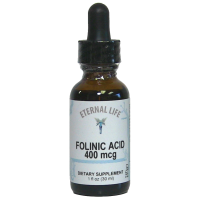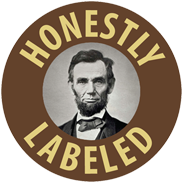




Folinic Acid
Folate is a very important B vitamin, and like B12 is critical in the body's natural abiliity to detoxify. Many get sufficient amounts of folate in their diet, and do not need to supplement. For those who do need to supplement, there are some serious questions that need to be answered.
There is an ongoing controvery and debate about folic acid, a synthetic form of folate. As many have noticed, you can switch from folic acid to the same dose in the natural form and get severely diminished results. However, many people are switching due to health concerns about folic acid.
Why is natural folate so much less powerful? Natural folate must first be converted to tetrahydrofolate before it can be utilized by the body, but this takes place in the intestines. Some people do this well and some don't at all.
With folic acid supplements, it must also be converted to tetrahydrofolate, but it takes place in the liver (in a two step process that includes methylation) and some people's bodies do this much more effectively. For those who use folic acid supplements long term, their bodies may have adapted to expecting higher than normal amounts of tetrahydrofolate. When these people stop folic acid supplementation, they feel worse off. (This may explain diminished results in part, but it could also be due in part due to the natural form being more buffered.)
Combine all of this with the fact that some people are very poor at converting either form. Unconverted folic acid accumulates in the bloodstream and negatively impacts cognition among other things. In this case the synthetic form especially becomes a problem because it is taken in higher doses than is found naturally.
Thus, it is quite a complicated mess. For poor converters, they will feel relief by avoiding folic acid but that does not mean their bodies don't need more tetrahydrofolate; it is just that folic acid is not the best path for them in particular.
Methylfolate is the methylated form of folic acid and for some poor converters it is deemed helpful. The reason is because they have trouble with methylation, and by providing a methylated form their body is being given a methyl donor. Methyl donors are able to ease brain fog in persons with poor methylation ability, and it may have little to do with the folic acid component.
The thing is folic acid supplements are limited to 400-800 mcg, whereas methylfolate is given in a 5 mg dose. If you try to sell a 5 mg folic acid on eBay you get your account closed. Somehow methylfolate is allowed to slip under the radar, but in the past folic acid in 5 mg was commonly available.
Now just because you take the methylated form of folic acid does not mean your body is able to convert it into tetrahydrofolate. Methylation is only the first step, and the body may still be a poor converter due to not producing enough dihydrofolate reductase—even though it is loving it as a methyl donor.
So the bottom line is that taking a form of folic acid that the body cannot properly convert into tetrahydrofolate can put you in danger, even if there are noticible benefits in how you feel.
At the beginning of this article we said folate was a critical B vitamin, but as we have seen this is not necessary true; there are just problems associated with other forms.
Where To Go From Here
There is one other form, which is considered to be a "form" of folic acid, but the proper name is 5-formyl tetrahydrofolate, better known as folinic acid. In supplemental form it is provided as calcium folinate (folinic acid bound to calcium, which provides it). It is the metabolically active form, so that means it can be utilized by the body without conversation, unlike the other forms.
Unlike folic acid, it is properly a folate. This form is not a methyl donor and will not have the benefits some are looking for (oddly) in a folic acid supplement. The advantage of this form is that it provides actual bioavailable folate and avoids the dangers associated with folic acid accumulation in the bloodstream.
You may not notice anything from taking it, or what you notice will be very subtle. This is common of B vitamins even though they are very important and benefits mount over time. Folate, including this form of folinic acid, is especially important in supporting DNA production and the body's natural mechanisms of detoxification, and protecting telomeres.*
Quality that Human Beings Deserve
















